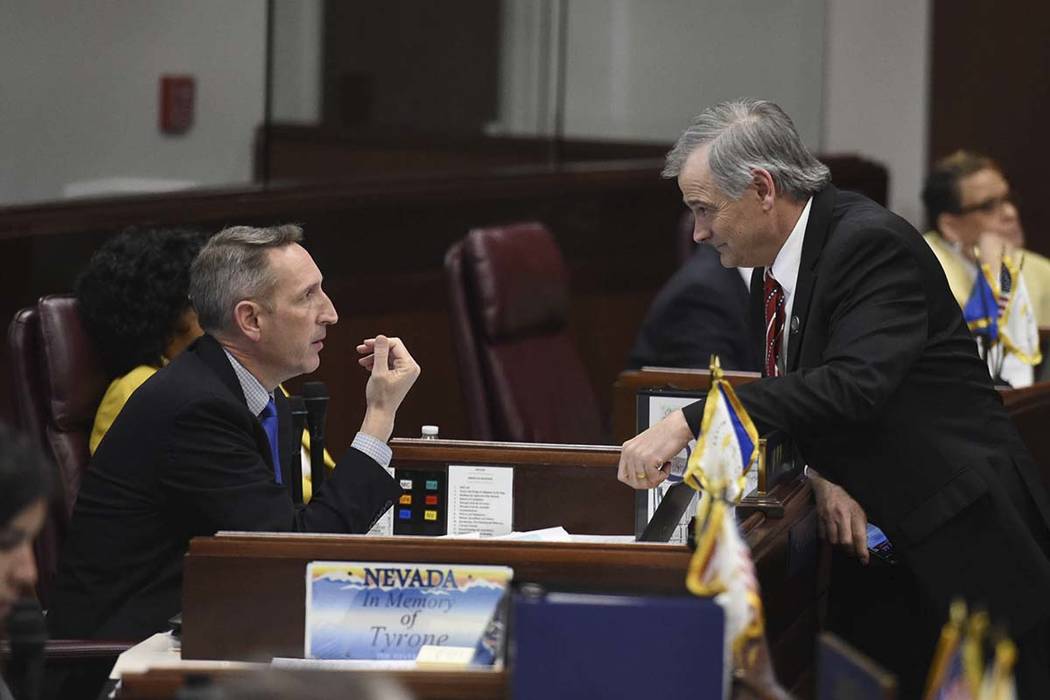STEVE SEBELIUS: We’ve seen this one before
CARSON CITY — Worst legislative sequel ever!
And, frankly, the 2003 original wasn’t that great to begin with.
Back then, a Democratic majority struggled to raise taxes to pay for education, fighting against a Republican minority firmly committed to just saying no and empowered by a constitutional requirement to muster a two-thirds vote for a tax increase. There were failed votes, raised voices and a Supreme Court fight.
Flash forward 16 years, and they’re rebooting the same movie.
Democratic majority? Check. Tax plan for education? Check. Republican opposition, with just enough votes to block the plan? Check.
There are different actors playing the parts, and some of the details are slightly different. This time, instead of trying to raise a new tax, the Democrats are simply trying to prevent an existing tax from falling to a lower rate. Adding to the drama: A Legislative Counsel Bureau opinion that breaks with years of past precedent says extending a tax at the same rate doesn’t require a two-thirds vote.
But it’s still the same flick, and we know how it ends: ugly.
This time, we start with Senate Bill 551, which would prevent the business payroll tax from falling. (That decrease was part of the incentive in 2015 to get Republicans to support the commerce tax, Nevada’s first levy on business income.)
The money raised by SB551 would go to pay for school safety programs — which Republicans had criticized Democrats for cutting earlier in the session — and various other education initiatives. But there was a twist in the original version: If one part of the bill were struck down in a lawsuit (say, for example, the tax extension), then the rest of the bill would fall as well.
It was a clever trick: Republicans couldn’t vote for school safety without voting for the tax extension, even in the hopes that a lawsuit could later kill the taxes while keeping the safety money.
It was designed to persuade just one member of the Senate’s GOP caucus to support the bill, thus reaching a two-thirds majority. (Even though Democrats had that legal opinion that said two-thirds wasn’t necessary, getting to 14 votes would moot any potential lawsuit.)
But Republicans recoiled from that bill, accusing Democrats of trying to strong-arm them into supporting a tax.
They should have read ahead in the script.
After one late-night amendment to SB551 (that was not online or even on a committee agenda) was quickly withdrawn, Democrats tried a one-two punch. First, an amendment that contained the missing two-thirds language, a carrot offered to Republicans so the Legislature would not set a precedent of extending taxes without a supermajority.
That failed after Republicans said there was no need for any taxes because the state had a surplus in this year’s biennial budget. Democrats countered that it was a one-time surplus, not money that could be used for ongoing expenses.
Then, the stick: Another amendment (that didn’t require two-thirds) that would not only extend the tax, but repeal the Republicans’ beloved Education Savings Account program, which was still on the books but unfunded as the result of a court decision.
Still, the GOP did not bend. So the Democrats approved SB551 —tax extension and all — by a vote of 13-8, just shy of two-thirds.
Republicans cried foul, saying if they had done the same thing to Democrats, there would have been howls of outrage. And that’s true. We know because, in 2015 when Republicans did do the same thing to Democrats, there were howls of outrage.
It rang a little hollow, however, after the Review-Journal’s Colton Lochhead reported that Republican Minority Leader James Settelmeyer, R-Minden, discussed with Democrats the possibility of raising the sales tax instead of extending the business payroll tax.
Settelmeyer said his offer had a huge caveat: Democrats would first have to prove that any tax was necessary, something he says they never did. Any Republican tax vote was thus entirely hypothetical and, essentially, calling a Democratic bluff.
But since we’re speaking hypothetically, it still appears Republicans would rather have raised a regressive tax on regular citizens than suffered business to continue to pay the payroll tax at the current rate. Could any Democrat running against a Republican senator in 2020 possibly make political hay out of that?
In any case, Settelmeyer said a lawsuit is all but certain, and he’s probably right. In 2003, the Supreme Court waded boldly into the tax debate, and issued a highly questionable, since-repealed opinion on the subject. Odds are the current crop of justices will be more careful this time around.
But epilogue and plot devices aside, it’s still the same old movie we saw in 2003, and it should still carry the same rating — PG-16, as in “please, God, let it be at least another 16 years before we remake this material again.”
Contact Steve Sebelius at SSebelius@reviewjournal.com or 702-383-0253. Follow @SteveSebelius on Twitter.

















